-
TheMadFool
13.8kI wish you had distilled the essence and then presented it here. The post and topic is a subject in and of itself. I, sadly, lack the time to read all of the great Khayyam.
What do you think the Rubaiyat, the only work of Khayyam I'm familiar with in a very superficial way, is about?
If I'm correct Khayyam was a polymath and had his finger in every pie.
Rubaiyat of Omar
In Australia, Somerton so far
it was 1948
when an unknown man met his fate
Tamam shud
the devil would if he could -
 PoeticUniverse
1.7kWhat do you think the Rubaiyat, the only work of Khayyam I'm familiar with in a very superficial way, is about? — TheMadFool
PoeticUniverse
1.7kWhat do you think the Rubaiyat, the only work of Khayyam I'm familiar with in a very superficial way, is about? — TheMadFool
It's about the human condition, pleasure, anti-Allah, and the suppression of reason and philosophy by the Islamics near and in 11th century Persia. It's the greatest poem in history in the exquisite form of it as transmogrified by Edward Fitzgerald in 115 quatrains, as the story of a day/life. See the first three videos for the quatrains. -
TheMadFool
13.8kanti-Allah — PoeticUniverse
Really? Wikipedia says they have a statue of him in Iran and the UN. I wonder if there was a posthumous fatwa.
Like Asterix used to say "These Romans are crazy", "These Persians are crazy" -
 PoeticUniverse
1.7kReally? Wikipedia says they have a statue of him in Iran — TheMadFool
PoeticUniverse
1.7kReally? Wikipedia says they have a statue of him in Iran — TheMadFool
Yes, and a kind of a shrine/memorial, too. It's paradoxical or perhaps it's more for his other work. -
 PoeticUniverse
1.7kWhich Calendar is More Accurate: The Pope’s or Omar Khayyam’s?
PoeticUniverse
1.7kWhich Calendar is More Accurate: The Pope’s or Omar Khayyam’s?
Tropical year: 365.242190 days
Jalil Calendar: 365.24219858156 days (Khayyam)
Gregorian Calendar: 365.2425 days
Justinian Calendar: 365.245 days
Austin's New Calendar
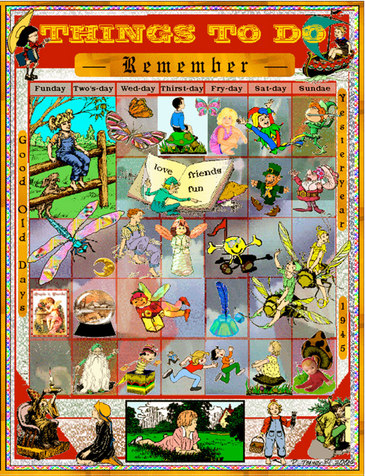
(The new last month of the year is ‘Remember’)
The last truly major revision to the calendar occurred over eight hundred years ago, when Omar Khayyàm realigned the Moslem calendar so that the seasons would arrive at the same time each year. Back then the year started in March, with the spring, the more logical time for a new year to start, I would say, since nature is new in the spring. It took Europe a long time to pick up on the changes. I suppose they got tired of celebrating Christmas in July-type weather or shoveling snow in the summertime.
Omar also revised his philosophic calendar to suit his mental outlook, by advocating that dead yesterday and unborn tomorrow be removed from the calendar; thus, he could truly live for Today. Later on, he refined this theory further by also removing dead and unborn minutes, so that he could live for the moment. My calendar revisions are more along those lines.
So, it’s high time for another major revision to the calendar, one that’s reflective of modern times, for the only improvements made during the last few hundred years have been to skip leap days in years that are evenly divisible by 400, and, more recently, to add a few insignificant leap-seconds every few year or so (”Wow, that seemed like a really long weekend!”).
First of all, I am eliminating the months of January (Bran-new-airy), February (Feb-buries), and March (March!) because, 1) They all contain cold and rotten weather, and 2) They totally lack holidays on which we could get time off with pay from work. It’s a heck of a long wait for a holiday between New Year’s Day and Memorial Day (we used to get Good Friday off, but now even that day has been eliminated, for it’s a religious-ethnic holiday and other religious-ethnic groups could then have proposed other such holidays, and so there’d be no time left for actual work days). Note: don’t worry, Valentine’s Day is being retained and moved elsewhere, as is New Year’s Day.
I am adding a whole new month, called Remember, which comes right after December. That way you will have some extra time to do all of the things that you meant or forgot to do during the year. Just think, there will be not as much need to say “Wait until next year!”.
My revised year starts in the spring, in April, which, as I’ve said, is much more appropriate, since it is a time for renewal and rebirth. By the way, it is easily proved that the year once started in spring by noting the Latin numbers from which the months got their modern names, i.e., 7-sept, 8-oct, 9-nov, 10-dec. We, of course, have now adopted these Latin numeric prefixes into general English, as well, for example, septuagenarian (age 70-80), octagon (8-sided), octave (8 musical degrees), novena (9 days of devotion), decimal (base 10), decimate (to kill one in ten), decathlon, decade, etc.
I also discovered that the old names of July and August were Quintus (Latin 5) and Sextus (Latin 6), but Julius and Augustus Caesar changed the names to suit their own. As for May, June, and April, those were the names of the Caesars’ girlfriends. So, anyway, what all this means is that since December used to be the tenth month (dec), the year obviously once started in March. I am generally readopting this policy, except that, since I’ve eliminated March, my revised year must now start in April, on April’s Fools Day, in fact, which will have to share the honor with New Year’s Day, an appropriate combination considering all of the foolish things that we do on New Year’s Eve.
So, since my year as so far constructed is only ten months long, I must now distribute the excess days that made up the two missing months. I would like to make all the months thirty days long, since people have problems with the current variations. So, I am introducing a new, unnumbered day into the week, called Funday, a day which does not have to be numbered or accounted for in any way whatsoever.
Funday occurs between Sunday and Monday. On Funday you can do as you please. Funday doesn’t even have a numerical date, and so it cannot possibly count against schedules, deadlines, or bills. Weekends, as we all know, have always been too short, but now, with the introduction of Funday, weekends become three days long.
I have, as have many others, already pioneered the concept that led to Funday: I get up late on Saturday and Sunday to recover energy spent during the work week, and then, by Sunday night, being so well rested, I go to sleep quite late or sometimes not at all and stay up all night reading or doing you know what. Of course, I pay for all of this by being very tired on Monday, but naturally it’s much better to be tired on company time than on your own time, and who ever expects much of Monday anyway.
So, this is what led me to the idea of a Funday on which you could do whatever you want; you don’t even have to visit your relatives. Funday is totally dedicated to fun, and a new law will make it a crime for you to do anything else, although shopping and home chores are allowed if you whistle while you work or sing a happy song. Yes, people are so harried these days that we have to force them to enjoy life.
So, thanks to Funday there will be no more rush-rush or hectic feelings when the work week starts. People need no longer waste short weekends of great weather by doing silly and ridiculous things like going grocery shopping or doing the laundry.
Well, you might say, instead of lengthening the week why not just get people to do all their weekend chores during the week, but, of course, they can’t, since they’re so stressed out and exhausted when they get home from work that they just collapse and can’t even do the simplest thing.
Yes, yes, I know that this is simply a matter of attitude and style, but, believe me, personal changes, even such common sense changes, seem to take huge amounts of effort; whereas, I can simply solve the problem more easily with the introduction of Funday.
But, ten months of thirty numbered days plus five undated Fundays each month equals only 350 days, so there are still fifteen more days that must be dispersed into the new calendar. I am solving this by adding a special summer and winter festival period of seven days each, the winter festival being no more really than a re-establishment of the old Saturnalian pagan festival held in olden times, before the Christians put a damper on it. This winter festival is added between Christmas and New Year’s Day so that we can have a vacation from our vacation of visiting relatives and feasting and pigging out. The summer festival is inserted between July and August, and centers around the true midsummer’s day. Naturally these festivals do not count against anyone’s vacation time.
There are just a few minor alterations left. There is still one day left to be accounted for, and I am inserting it between May and June as Valentines Day. I am removing a day from June, so that the saying “Nothing is so rare as a day in June” will actually be true. In the old calendar, a day in February was 4.2% more rare than a day of June, but, of course, February is gone now. The day removed from June will be called World Day. On this day we should try to get all the world’s peoples to coexist in perfect harmony. This day occurs between June and July. I am moving the Fourth of July holiday to the first Monday in July so that we will have yet another extra long weekend.
Monday mornings and Friday afternoons are to be designated as home/work transition adjustment-recovery periods, during which one need not be present at work, thus reducing the work week to only four days!
Yes, the computer age has arrived and it’s time that we reaped its benefits and gained more leisure time, for this was the promise of the computer age: that computers would free us, so why do I feel like they have become our masters?
Furthermore, the nebulous day called Someday is being removed from the calendar and from everyday conversation, because what it really meant was “Noneday”, as in “Someday we’ll go out to lunch”.
Also, just as a matter of information, note that the days of the week were named after the sun, the moon, and all of the known planets of the time, although some of the days derive their names from French or Latin: Sunday (sun), Monday (moon), Tuesday (Mardi in French, or Mars), Wednesday (Mercredi, or Mercury in French), Thursday (Jeudi in French, or Jupiter), Friday (Vendredi in French for Venus), Saturday (Saturn). However, this still leaves Pluto, Uranus, and Neptune unrepresented, but I’ll probably leave those for my next revision.
My new names for the days of the week are: Onesday, Twosday, Wedsday, Thirstday, Fryday, Satday, Sundae, and Funday, and are for, respectively, self, relationships, marrieds, drinking, frying fish, sitting around, ice cream and fudge, and fun.
Or, we could just forget all of these revisions and go back to Omar’s great idea about having a calendar with only one day on it: Today.
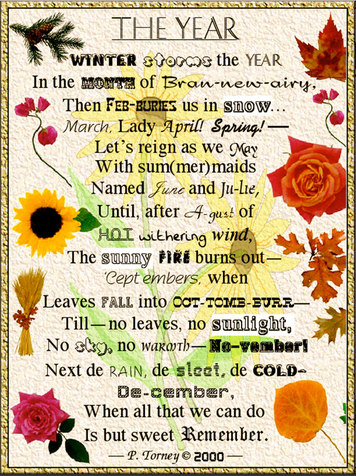
-
 PoeticUniverse
1.7kLate Afternoon at the OK Club—Part 1—More ‘Now’, plus ‘IS’ & ’Nothing’
PoeticUniverse
1.7kLate Afternoon at the OK Club—Part 1—More ‘Now’, plus ‘IS’ & ’Nothing’

(Click.)
Bora-Bora Bored in Tahiti
Ruby and I pour each other a glass of wine, and it tastes just as sweet in whatever whenever frame its ‘now’ settles in to.
Now
To future columns we stretch our present row,
By a lifeline of tenuously spun vow…
Oh. how soon the weighted web begins to fail;
The only real time under our feet is now.
Hectic and hurried, we rush to success.
Serenity can’t find us unless
We slow down, see shades, hear tones, feel textures,
Smell scents, and enjoy life’s loving caress.
See them hurrying hither and thither:
Oh, look at the time! I must go whither.
What sense the life that has no time to live?
Wherefore the wind that swirls in a dither?
A moment of eternity in hand,
Caught from a wingéd creature on time’s sand,
Yet put aside to later view in peace.
It flies. Now pursue it through Never-Land!
Let not the certainty of the present be
Held mortgage for the Deed of Futurity,
For tomorrow’s just a gleam from afar
And yesterday’s but a cold ash of thee.

(Ruby)
“Did you vote today, Austin?”
“No, but In my bridge game, I bid one No-Trump and my partner raised to two Clintons.”
“Ha-ha. There is a Rubaiyat of Bridge, you know.”
“I have it. I’ll post it one day.”
Election Day For the Eternal Basis
“What happens, from there being no election,
Of that which hath no point for direction?”
“Everything happens, for it e’er changes,
Revealing all faces of complextion.”
Ruby Yacht nods and says, see this quatrain:”
The sphere upon which mortals come and go,
Has no end nor beginning that we know;
And none there is to tell us in plain truth:
Whence do we come and whither do we go.
—Ahmad Saidi
“Has no end or beginning” seems to be right on target, as eternal/ever, since, given that ‘Nothing’ can’t be productive because it can’t exist to do anything. Therefore, what ‘IS’ must be ungenerated and deathless, as Parmenides indicates.”
She adds, “FitzOmar refers to Nothing four times, mostly as some ultimate oblivion.”
“And his Nows are ubiquitous, and his 'Great Wheel' is 'What is'.” -
 PoeticUniverse
1.7kParmenides’ Unity in Multiplicity
PoeticUniverse
1.7kParmenides’ Unity in Multiplicity
Preface
(Stanford Encyclopedia of Philosophy)
‘What Is’ both must be (or exist), and it must be what it is, not only temporally but also spatially. For ‘What Is’ to be (or exist) across times is for it to be ungenerated and deathless; and for it to be what it is across times is for it to be “still” or unchanging. For ‘What Is’ to be (or exist) everywhere is for it to be whole. For it to be what it is at every place internally is for it to be uniform; and to be so everywhere at its extremity is for it to be “perfect” or “complete.”
Taken together, the attributes shown to belong to what must be amount to a set of perfections: everlasting existence, immutability, the internal invariances of wholeness and uniformity, and the invariance at its extremity of being optimally shaped. What Is has thus proven to be not only a necessity but, in many ways, a perfect entity.
Parmenides may be counted a “generous” monist. While he reasons that there is only one entity that must be, he also sees that there are manifold entities that are but need not be (what they are). Parmenides was a generous monist because the existence of what must be does not preclude the existence of all the things that are but need not be.
It seems preferable to understand ‘What Is’ as coterminous but not consubstantial with the perceptible cosmos: it is in exactly the same place where the perceptible cosmos is, but is a separate and distinct “substance.” On this view, ‘What Is’ imperceptibly interpenetrates or runs through all things while yet maintaining its own identity distinct from theirs.
On Nature
Poetic Fragment
The mares that carry me
As far as my spirit might reach
Were escorting me,
When guiding they placed me
On the much-informing road of the Goddess,
Who leads the man who knows through all.
There I was being carried,
Brought by wise mares who were
Straining the chariot,
While maidens were leading the way.
The axle’s nave shrilled like
The bright sound of a pipe, sparkling,
For it was pushed ahead by
Two whirling wheels at either end,
While hastening to escort me.
The Daughters of the Sun—
Having left the House of Night for the Light—
Thrust back with their hands
The veils from their heads.
Here are the Gates of the Paths of Night and Day,
And they are bound together
By a lintel and a stone threshold.
They are high in the sky
Blocked by mighty doors
To which avenging Justice
Holds the alternating keys.
Here the maidens implored with gentle words…
And knowingly persuaded her to push back quickly
From the gates the bolted bar.
And a gaping chasm of the doors
Was produced by the gates' opening
Which had set revolving in the sockets one after
The other the brazen axes fitted with bolts and pins.
Then, straight through them.
The maidens kept the chariot
And horses on the broad way.
The Goddess received me graciously,
Taking my right hand in hers,
And addressed me with the following words of counsel:
“Young man, accompanied by immortal charioteers,
And the mares who carry you to my abode, welcome.
“It is not an ill fate
Which has sent you forth to travel this road,
Though it is far from the beaten path of man,
But Right and Justice.
“It is necessary that you learn all things,
Both the unshaking heart
Of well-rounded, persuasive Truth
As well as the opinions of mortals,
For which there is no true evidence.
“But nevertheless these you shall learn as well:
How it would be right for the things of opinion,
To be provedly things that are altogether throughout.
“Come now, I will tell you—
And preserve my account as you heard it—
What are the only ways of inquiry for reasoning:
The one that IS, and that it cannot NOT BE,
is the Way of Persuasion, for it follows the Truth.
“The other IS NOT,
And that it is necessary that it NOT BE,
This I point out to you is a completely inscrutable path
For you cannot know that which IS NOT,
For this cannot be done, nor can you express it.
“It is necessary to say and to think Being,
For there is Being, but nothing is not.
These things I order you to ponder.
For from this first way of inquiry I hold you back.
“Behold things which, although absent,
Are yet securely present to the mind;
For you cannot cut off What IS
From holding on to What IS;
“Neither by dispersing it in every way,
Everywhere throughout the cosmos,
Nor by gathering it together or unifying it.
“But next from the way on which mortals,
Who know nothing, piece together two-headed;
For helplessness in their breasts
Guides their unsteady mind.
“They are borne along, deaf as well as blind,
Stupefied, hordes without judgment,
For whom to be and not to be are deemed the same and
Not the same; but the path of all turns back to itself.
“For never shall this be forced:
That things that do not exist;
But do you hold back
Your thought from this way of inquiry,
Nor let inured habit force you, upon this road,
To ply an aimless eye and ringing ear and tongue;
But judge with reason
The much contested argument
Which has been given by me.
“There is still left a single story of a way, that it is.
On this way there are signs exceedingly many—
That being ungenerated it is also imperishable,
Whole and of a single kind and unshaken and complete.
“Nor was it ever nor will it be, since it is now,
All together, one, continuous.
“For what birth will you seek for it?
How and from where did it grow?
I will not permit you to say
Or to think from what is not;
For it is not to be said or thought that is not.
“What necessity would have stirred up
To grow later than earlier, beginning from nothing?
“Thus it must either fully be or not.
Nor will the force of conviction
Ever permit anything to come
To be from what is not, besides it.
“For this reason, Justice permitted it
Neither to come to be nor to perish,
Relaxing her shackles, but holds fast;
But the decision about these matters lies in this:
It is or it is not.
“Therefore, as it is necessary,
The decision has been taken
To leave one way unthinkable and unnamable,
For it is not the true way,
And the other way to be and to be true.
“How could Being be hereafter?
How could it have come into being?
“If it was, it is not,
Nor if it is going to be in the future.
“In this way,
Coming to be has been extinguished
And destruction is unheard of.
Nor is it divided, since it all is alike;
Nor is it any more in any way
Which would keep it from holding together,
Or any less, but it is all full of what is.
Therefore, it is all continuous,
For what is draws near to what is.
“But unchanging in the limits
Of great bonds, it is,
Without start or finish,
Since coming to be and destruction
Were banished far away
And true conviction drove them off.
“Remaining the same and by itself
It lies and so stays there fixed.
“For mighty Necessity holds the bonds of a limit,
Which pens it in all round,
Since it is right for what is to be not incomplete;
For it is not lacking;
If it were, it would lack everything.
“Thinking and the thought that it is are the same.
For not without what is, in which it is expressed,
Will you find thinking.
“For nothing other, besides Being, either is or will be,
Since Destiny fettered it to be whole and immovable;
“Therefore, all that mortals posited convinced
That it is true will be mere name,
Coming into being and perishing, to be and not to be,
And to change place and alter bright color.
“But since there is a furthest limit,
It is complete on all sides,
Like the bulk of a well-rounded ball,
Evenly balanced in every way from the middle;
“For it must be not at all
Greater or smaller here than there.”
“For neither is there non-Being
To prevent it from reaching
Its like, nor is there Being so that it could be
More than Being here and less than Being there
Since it is all inviolable;
“For from every point it is equal to itself,
Staying uniformly in the limits.”
“Here I end my trustworthy account
And thought concerning truth.
From now on learn the beliefs of mortals,
Listening to the deceptive order of my words;…
“For they decided to name two forms,
A unity of which is not necessary—
In which they have gone astray
And they divided form contrariwise
And established characters apart from one another.”
-
 PoeticUniverse
1.7kLate Afternoon at the OK Club—Part 2—The Great Wheel
PoeticUniverse
1.7kLate Afternoon at the OK Club—Part 2—The Great Wheel

Walking out in the Garden for a smoke and some air
After having some early hors d’oeuvres, Ruby and I are playing pool, while drinking one of Martin’s concoctions—a Lime Cordial.
I have to remember from thirty years ago how to play pool: line up the shot but still see the cue ball and the object ball in one field of vision, stroke true and firm, and plan for good position on the next ball, presumedly having all easy shots thereafter until bad luck arrives.
Ruby Yacht’s gears were/are turning, prepared by she having lived a life of wonder, and long inspired by the actualities and philosophies of one of the first great polymaths of old, Omar Khayyam. She is also a scientist.
Ruby begins, after breaking the rack of balls, “There is no ‘Great Wheel’ mentioned, per say, in FitzOmar, although it’s greatly hinted at by ‘It Rolls impotently on as Thou or I.’, but I found five Wheels in your retransmogrified Bodleian Manuscript Rubaiyat:
12
Worries seldom come true, but, if they do,
Thus they had to, so in them you must stew.
Past imperfect points to a future tense,
Yet ever only Nows does the Wheel brew.
41
What ‘IS’ can no more not exist than it
Can rule any of what goes on in it;
Impute not thy blame, shame, or fame to it—
Fate’s Wheel’s as helpless as all within it.
73
Dash quick away the trade of worldly gain,
Unlinking thy chain to the good and bane,
And with wine and kisses soothe ev’ry pain—
Till sky’s whirling Wheel doth your roll restrain.
129
Yon Heaven’s Wheel flings its comet portent,
The plot to end our lives unimportant.
To the lawn, love, for one day we shall be
As the grass that grows about our tent.
154
Fate’s Wheel soft whispers in my ear, “I know
What’s been decreed—just ask and I will show.”
Were mine the hand that made myself revolve,
I should have saved myself from reeling so.
Ruby continues, “So, the ‘Wheel’, ‘Totality’, ‘All’, ‘Fate’, ‘God’, ‘What is’, and the like are all referring to the brief ‘answer’ of the most often asked question of ‘Where did everything come from?”, and secondly, asking, probably, “Where did the ‘All’ itself come from?”
I answer, “Apparently, the Great Wheel doesn’t have any coming from, being ever, with no creation of it, as Parmenides indicates. And, of course, I can’t fathom a never-ending depth of ever lower and tinier causes and effects in an infinite regress, for the effect would never be able to surface, it taking ‘forever’, so, the buck has to stop somewhere, either with quarks or in something not far beneath them, it being suspicious that quarks have a charge of 1/3.”
“Yes, but that no-coming-from is only apparent since we have to accept that the basic Something exists already made without ever having been made; it’s just as paradoxical as it having a Beginning, as of the Something coming from Nothing, but for ‘Nothing’ not being able to be! I am being careful here, and will be, lest I state “maybe’s” as if they are fact and truth, as so often do the religious, which is far from honorable.”
“Well, Ruby, would you like to banish ‘Nothing’ once and for all by tentatively letting its proponents somehow have it to exist, as silly as that seems, for they will only ever keep on touting it as a source.”
“OK, Austin, let us allow for the moment that there was a total lack of anything, impossible as that seems:
1. This state of ‘Nothing’ would still be so; however, oops, there is something…
2. Yet they will answer that the Something came out of or from ‘Nothing’ or was spontaneousness, etc;
3. However, since this capability/possibility/potential
exists, then they didn’t really have an absolute ‘Nothing’
to begin with, as they claimed,
4. And so we are back to that of this capability then being
what is eternal and ever.
5. I rest my case, and thus still accept an Eternal Basis,
either way.
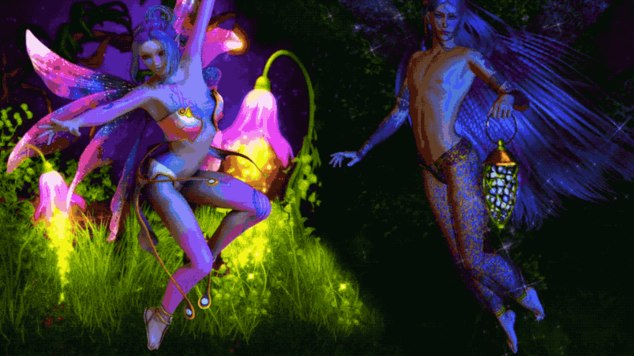
(to be continued) -
 PoeticUniverse
1.7k
PoeticUniverse
1.7k
(Click.)
The OK Club’s Swimming Pool
Ruby notes, “I also found the below redone Bodleian quatrains of yours entertaining and some pertaining, and, Austin, my dear, for an even more startling ado about ‘Nothing’, it is that there can’t even be any spacers of nothingnesss between things anywhere, nor anything such as ‘Nothing’ outside of the All.”
72
Our being blocks the view of the Ultimate,
Nor to gaze at it can we our selves acquit.
Ee’n the wise can’t step beyond their nature—
All mothers’ sons stand helpless before it.
95
What be: thy output must form from input,
For naught else can stride the moving foot,
And surely naught from nought makes no ‘random’;
The pen can’t revise its scroll; “we’re” caput.
107
How long will they prate of eternity?
Why proclaim as sure an uncertainty?
’Tis yon the cape of man’s ability.
To unlock every door, wine’s the key.
121
Thrust into life, we seek the depths to know
The plots beyond the curtains of the show,
Learning naught but a whisper from the waste:
“We came as water and to dust we blow.”
130
E’en the smoke from ember’s ash fades away,
That warp with the woof and weave burned to clay.
How many beautiful hearts have melted here?
Where in heaven’s cosmic vault wefts their sway?
“If nothing was between things then the things would be adjacent.”
“Right. Possibly all is field, as Einstein thought.”
“So, Ruby, what would be the nature of the Eternal Basis—The Great Wheel?”
“There’s no point for its nature to have been decided, specifically, given no beginning, this perhaps leaving anything and everything, as ‘random’.”
“I like ‘random’ for the ultimate fundamental, because Anton Zeilinger shows in his experiments that “Randomness is the bedrock of reality” to a deep and reliable quality of 3-sigma or more. Quantum Mechanics finds random, as well”
“Which points more toward a potential everything from ‘random’, maybe, rather than all of it fully formed to begin with, although it could apply somehow to the initial conditions of a Block Universe being random, I suppose.”
“Still, would the basis be a superposition of everything all at once or as potentially everything as in the going through of every possible path, eventually, not that it seems to matter a whole lot?”
“Oh, Austin, we don’t know if time’s mode is of Eternalism or Presentism. We’re stuck there on such a seemingly simple thing such as time. One difference that may not matter is whether all is pre-determined, as in Eternalism, or just as well but more slowly determined as Presentism goes along, now by now. You’re right perhaps in that for our purposes here it may not matter.”
“Well, let’s let that mystery sit for now, We still have the indication of ‘random’ for the Fundamental ‘bedrock’, which state of an output without an input is ubiquitous in the sub-atomic quantum realm. What can we gather from what has already and actually gone forth from and via this Great Wheel of All?”
“It operates horrendously slow, except when it begins a universe, with a lot of waste and extravagance, as if it wasn’t able to do anything any other way, it thus matching just what we’d expect of a purely physical nature, given its tiny fundamental components, life not seeming to be of any immediate concern. A Big Bang happened at some arbitrary time and place, with a near forever having passed, and apparently a past-eternal already having done so, as if it’s some rare event coming out of Eternity’s waiting room in which a lot of meaningless time can pass before the right conditions obtain. We surfers of light are of only 4% of the universe’s stuff. Please comment as I go on.”
(to be continued) -
 PoeticUniverse
1.7kI add, “A quark-gluon plasma comes forth, later, which had to cool off during 380,000 years of opaqueness, which we cannot penetrate yet, but hope to do via its gravity waves, after which time there came light, with photons, protons, and the first few, simple atomic elements, unto stars and supernova making the rest, then molecules, which luckily are neither inclined to form or to stay together after, RNA/DNA, cells, organisms, brains, consciousness…., this ‘life’ seeming as a kind of ‘afterthought. Sorry, I’m getting too far ahead.”
PoeticUniverse
1.7kI add, “A quark-gluon plasma comes forth, later, which had to cool off during 380,000 years of opaqueness, which we cannot penetrate yet, but hope to do via its gravity waves, after which time there came light, with photons, protons, and the first few, simple atomic elements, unto stars and supernova making the rest, then molecules, which luckily are neither inclined to form or to stay together after, RNA/DNA, cells, organisms, brains, consciousness…., this ‘life’ seeming as a kind of ‘afterthought. Sorry, I’m getting too far ahead.”
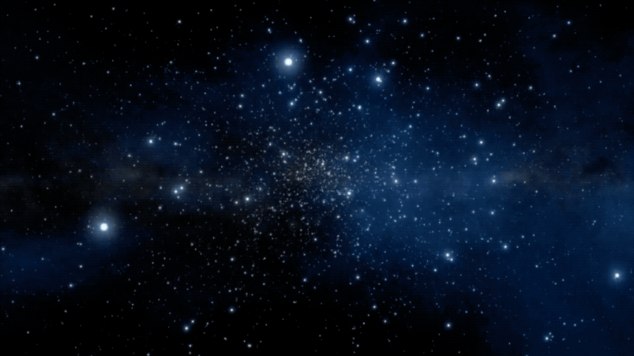
(Click.)
Ruby looks up, as if through the ceiling and up to the stars, remarking, “I’ve come such a long way to be here, with you, but our possibility was there in the beginning, although spread all over.
“The Planck era at 1E-43 seconds was the first hint of us, as a cyclical compactfication or a vacuum fluctuation eruption in an indefinite realm that’s as close to Nothing as can be, but it can’t be a Nothing as such, since that would be a definite, whereas the vacuum as the basic quantum something must be fuzzy, uncaused, and undirected, matching that which we often note in the quantum realm. Apparently, motion can’t cease, for energy cannot be destroyed.”
“I’ll knock Stillness off of the list of what can be, as being a kind of a cousin of ‘Nothing’, which we’ve already banished, along with ultimate Beginnings and Ends, plus Infinity, because it can’t be capped and so it cannot be had all at once or ever, since one can always add to it; it never completes, and that is more toward its meaning, not a meaning that it is a number or an amount. I’ll add ‘random’ as probably requiring a fundamental level or the quantum level, and as dubious otherwise, as it’s mostly evened out at the macroscopic level.”
“So, Austin, to learn the Secrets of what IS and ever WAS, we must again brave the crypt and ghost of cause, as the causeless. The so-called quantum foam seems to be ever and always, remaining even now, and it still has pairs of virtual particles quick appearing and then annihilating and disappearing, as a kind of ‘noise’, during which events time still passes without any useful change overall, as the noise may not often produce something that lasts a bit or more.”
“Indeed, I answer, “The virtuals are ‘somethings’, or ‘sum-things’, as one might call them as of possibility or potential, but have not yet a true, meaningful existence until they become part of an information process and thus are able persist in their effects and go forward somewhat or greatly. This state has always been, and must be, so jot: that this All is ever here to be, since nothing cannot. We philosophers love to fathom the cryptic, where perhaps only the shade of substance slept with arithmetic, although the descriptions in physics are very amenable to math.
“There is a basic lightness of elemental being because anything more would have to be of parts, and thus beyond the fundamental arts. Bits of information need to be separated to operate, maybe, perhaps manifesting by ‘creating’ a Planck sized piece of space. Maybe we experience their separation as space. The bits can have relative relationships, which is a must, there being nothing outside or before the All, such as absolute rulers or clocks. Time evolves as relations form, all of them having to be relative. Mass, energy, and information have been shown to be equivalent.”
“So, then, where the causeless reigns supreme, the spark nursed by embers is the first that the universe remembers, as it fires toward the other members in a processing way. The opposite twins are as virtual pairs that rule the causing call, these positives and negatives constituting most of the All.”
“Yes, I’ve often thought of the many opposite states appearing in nature, such as matter and antimatter, left and right, up and down, the polarity of charge, on/off, and many more, as a near zero-sum equation.”
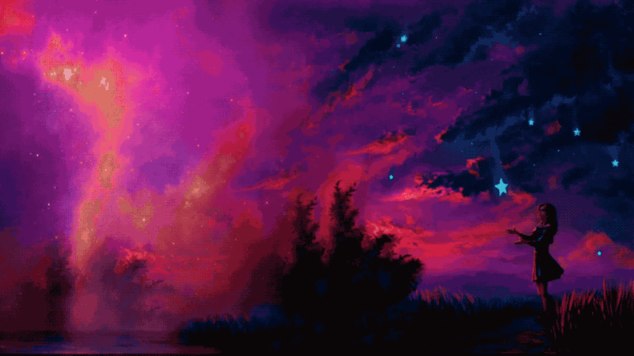
(Click.)
(to be continued) -
 PoeticUniverse
1.7kLate Afternoon at the OK Club — Part 4 — The History of All History
PoeticUniverse
1.7kLate Afternoon at the OK Club — Part 4 — The History of All History
Bodleian 28
Life’s spirit to the causeless was near blind.
Quoth I, “If the Beginning you could find—
The Alif—of word, phrase, and uni-verse,
Thou needs not the alphabet—All’s been mined.”
Night is falling and dinner is on the cusp. We take a break from our game of pool, obtain another drink, Houdini’s Vodka Gimlet, from Martin’s bar, and step outside for a moment, and surprisingly hear the following from the night skies:
“I’m the darkest,” says the Shadow to the Night.
“No,” says Midnight, “compared to me you’re bright.”
“You floodlights!” says Starless Space, “Stop your fight.
The darkest plight is the lack of love’s delight!”
We look at each other. She relates:
Days are the cyclic units of time’s pearls—
Beads worn round in the necklace of the months;
They distance themselves, like night echoes,
Into the rosary of the seasons.
Back inside, Ruby Yacht readies to continues her Cosmic description, naming it ‘The History of All History of Our Universe—From the First Instant Unto the Last.”
Martin braces himself for the shower of cosmology that is about to spew forth to bare the rafters of the universe’s beginning, middle, and end, and so he raises three glasses in Bodleian toasts to all and especially to Ruby:
39
My heart’s blood gleams like a melted ruby,
The wealth of mine—the gem that flows in me;
My goblet enshrines my wounded heart’s tears—
Wine is my soul and the cup my body.
87
Bring thy ruby mined, in a crystal thrust,
The drink that raises one up from the dust,
For who knows what breezes blow into gales.
This world is but a passing whirlwind’s gust.
92
Rubies from the vine’s mines are melted up,
As the moon-veil dissolved in the sun’s sup,
In pearled crystal goblets of the flow;
Oh, sparkle with life’s essence sweet—thy cup!
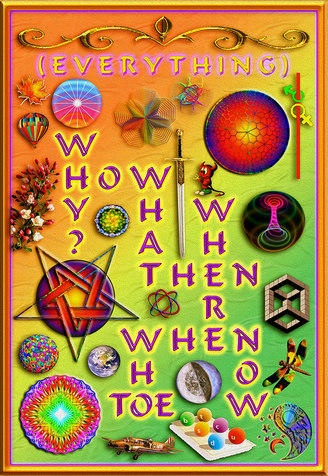
“The Great Wheel of our universe proceeds very quickly at first. At 1E-36 seconds, in a GUT transition in a hell of a short time, the strong force separates from the electro–weak force, the strong force eventually providing for stability and the weak force for changeability, another great balance. Inflation begins, maybe, as a slow rolling scalar field generates negative pressure, causing an exponential expansion of spacetime. The doubling is of a vacuum energy density of 1E73 tons/cm^3. Quantum fluctuations lock in nearly scale invariant 1E-5 variation in energy density. Here the enigma of the ever immortal is undone and unloosed through its portal.”
“Or at least inflation is proposed, for nothing else makes sense yet. The galaxies would seem to be the quantum fluctuations writ large across the night sky.”
She continues, we alternating, “At 1E-34 seconds, inflation quickly ends, the decay of the scalar inflaton field causing reheating. Is this the ‘let there be light moment’? No, photons don’t exist yet, but other massless vector quanta like left and right weak and B-L particles may exist. Things are not well known about this era. You and I are still but a twinkling in the cosmic eye.”
“What is here now was there in the beginning.”
“At1E-34 to 1E-8 seconds, in the quark era, there is the quark gluon plasma, and then quarks and perhaps super particles dominate matter content. At 1E-17 to 1E-15 seconds, SUSY breaking occurs when proposed super partners acquire mass with the LSP expected to have a mass of about 10 Tev. In induced gravity models, this is where mass energy first generates the induced gravity field; gravity is born, and we are grounded. “At 1E-10 seconds, there comes the electroweak transition, when the electroweak force, under the action of the Higgs mechanism, breaks symmetry. The photon is born. Standard model particles acquire mass.”
“Yeah! The photons guide us, as illumination beside us, while the mind whirls round and round, as the ear draws forth the sound, as the eye sees the light, and of the dark the fright. Fear not the proof—it’s the beauty of the truth.”
(To be continued) -
 PoeticUniverse
1.7k“At 1E-5 seconds, quark confinement comes about when the QCD vacuum becomes superconducting to color magnetic current. Quarks and gluons become confined.”
PoeticUniverse
1.7k“At 1E-5 seconds, quark confinement comes about when the QCD vacuum becomes superconducting to color magnetic current. Quarks and gluons become confined.”
“Ah, the quarks can never exist independently again.”
“At 1E-5 to 1 E-4 seconds, in the hadron era, protons, neutrons, and pions, etc., form. Now our future atoms are on the horizon.”
“What a long road our parts travelled.”
“At 1E-4 seconds, hadron annihilation occurs during a brief period of proton/anti proton and neutron/anti neutron annihilation. A slight favoring of matter over anti matter, possibly locked in by CP violation at reheating allows some very few excess protons and neutrons to survive, with ten billion photons for every matter particle now, which tells us how many annihilations there were, as 10*9, along with how much more there initially was.”
“It’s still a humongous amount of stuff, albeit gone from 2x10*85 particles down to 2x10*76.”
“At 1E-4 to 10 seconds, in the next era, leptons are the dominant energy density, such as electrons. We are up to about one second after the Big Bang now, at neutrino decoupling, when mass energy falls low enough to free neutrinos, creating the neutrino cosmic background.”
“We’ve many hints from the Cosmic Microwave Background, too.”
“At 10 seconds, electrons and positrons annihilate, leaving a tiny fraction of electrons remaining. At this point the total number of electrons equals the total number of protons. This is a beautiful symmetry.”
“Protons are of positive charge, while electrons are negative.”
“From 10 seconds to 57 thousand years is the radiation era, in which photons created from the annihilation of matter and anti-matter dominate the energy density of universe. Light has been let; We will shine.”
“Of course, our shining turns out to be another very slow part, later, in bio evolution, taking four billion years.”
“At 1-5 minutes, nucleosynthesis begins, as fusion of protons creates helium, deuterium and trace amounts of lithium. A few of our basics are there. Hydrogen is already present, it being so simple.”
“From the simple, composites and complexities form, as we ever note, through and through.”
“At 57,000 years, there is matter/radiation equality. The radiation density (photon and neutrino) and matter density (dark and atomic) are equal. This is because radiation density falls more quickly due to the stretching of the relativistic particles’ wavelengths. Dark matter clumps into structures. Atomic matter begins oscillation due to the battle between gravity and photon pressure generating acoustic oscillations. The first sounds of the new universe come forth as the ‘word’.”
“Gravity ever pulls back toward the past but the electromagnetic waves ever pull ahead, toward the future.”
“At 380,000 years, there is recombination, when the temperature falls low enough to allow atoms to form; photons decouple. The true CMB is born, locking in its structure—the story of the earliest times in the universe.”
“The radiation by now has been shifted into the microwave portion of the e/m spectrum.”
“For 5 to 200 million years, there is a dark age, as the photons fall into the infra red energy range. The universe goes dark. The atomic gas continues to fall toward the dark matter clumps, which grow more pronounced. Near to 100 million years, the densest clumps halt their expansion and begin collapsing. By 200 million years, the first mini halos form and within these the atomic cloud cools and collapses to make the very first stars whose light brings to an end the dark era. We are totally the hopes of further stars yet to become. By the way, I forgot that inflation could have been so fast that some virtual particles couldn’t recombine, thus becoming real.”
“It’s auspicious and of good fortune in the Meadows of Heaven. I have a poem of it.”
“At 200 million years, there are the first stars, which are very massive and short lived, but emit some lower atomic elements since this doesn’t require extra energy. They die in violent supernova explosions filling the cosmos with the higher atomic elements that needed energy to be added, building dust for new stars and the planets of solar systems, and the elements for life.”
“The later generation stars are much more metal rich, this needed for solar system life to form.”
“At 200 to 800 million years, there is the epoch of ionization, in which the radiation from the stars and possibly the first quasars, ionizes much of the remaining neutral hydrogen and helium. A thin mist returns and partly obscures the CMB, but future Low Frequency Radio Telescopes may be able to see the epoch of ionization.”
“We’re getting through the first billion years.”
“At 1 to 2 billion years, there become infant galaxies, as star groups merge. There are frequent collisions of galaxies, high star birth rates, and high supernova rates. Heavy element production changes the pattern of star formation, making them lower mass, less luminous and longer lived, like the second generation stars of today. The stage is set for the emergence of life; the cosmos will soon have eyes to see and minds to think, like ours.”
“Um, your ‘soon’ takes another 10 billion years.”
“At 2 to 3 billion years, there is a star birth and quasar peak. In the dense environment of frequent galaxy collisions, the star birth rate reaches it maximum, as does the forming and feeding of supermassive black holes, as horrible darkling beasts. Abandon hope all ye who enter there.”
“Four to five billion years gone, and just as much to go to achieve the very early life of bacteria, who, by the way, took two billion years to make Earth’s atmosphere, by exuding oxygen as a waste product, as it was poisonous to them. Slow indeed.”
“At 6 billion years, there are the first very rich galaxy clusters, since enough time has elapsed for the densest regions to stop expanding and form these clusters. At 7 billion years, there is decelerated acceleration. The effects of dark energy kick in. The universe once again begins to accelerate its expansion rate, but gentler. Gravity has lost the battle.
“At 8 billion years, the first modern spiral galaxies form, although some elliptical galaxies form in the first billion years, but classic spiral galaxies aren’t seen until at about 5 billion years. Let’s skip over the next three billion years. That should be enough time for us to have dinner.”
“Yeah, nothing is near instant but for the Big Bang, and I’m starving.”
(To be continued.) -
 PoeticUniverse
1.7k
PoeticUniverse
1.7k
131
Though hewn for study of the stars I am,
And philosophy too, hear Old Khayyam:
Let her tangled tresses attract your view,
And enjoy wine, verse, and a leg of lamb.
I run my hand through Ruby's hair.
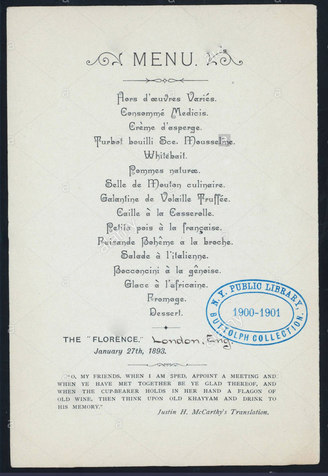
Bodleian
33
The universe’s mantle binds us worn—
Tears feeding the river on which we’re borne.
Hell’s but an ember of our senseless fears;
Heaven’s the rose-breath of opening morn.
105
Relate my good deeds o’er and o’er again,
And forgive each fault, sin, and crime times ten.
Let’s not kindle, stir, blow, or fan the flame;
Grace is Divine; no need to ink the pen.
110
Oh, meddling thoughts that harp on reason’s plea,
My cheeks glow red from the loved one’s grape tree,
So to your face I throw my other hand,
And drop you into sleep, oh fantasy.
Ruby says, “It would be refreshing to act silly, after all that seriousness and considering the effects of our drinking.”
“Good idea!”
“What is this on the menu?” she asks, pointing to something odd.
“That’s escargot—land snails.”
“Ah, good to have some slow food instead of fast McDonald’s.”
“It’s Lent; one must have fast food!”
“No, it isn’t; nor is it Ramadon.”
“This is a formal dining room for the creme de la creme, the imagined elite of the old Omar Khayyam Club of over a hundred years ago!”
“Hey, the snail, it’s moving!”
“Oh, it’s on the menu, and walking across it!”
“I must be from someone else’s dinner; they really should have cooked it more.”
“Look at that ‘little car go’!”
“It’s solar powered.”
“So are bacteria, via photosynthesis.”
“Are bacteria the back doors of a cafeteria?”
“We are getting our humor languages mixed up.”
“Oh, OK, then, ‘Souhaitez-vous embrasser un chameau?’”
“That’s not quite right. You just asked me if I wanted to kiss a camel.”
“Oh, I’m sorry. Let’s stick to English and get our dinner going onward somewhat more romantically.”
“To you, my dear: You are the bubbling froth that stirs and excites the drink.”
“And to you, my sparking spirit friend: may the bubbles burst across your pallet, and also upon your tongue, the drips of that juicy flood watering your taste buds.”
We leaned across the table and met in a kiss.
“Such a tasty appetizer upon my lips.”
“Soul meets soul in a kiss, like an eclipse.”
“To the ends of the galaxy we will go!”
“And beyond the edge of space.”
“There’s nothing there.”
“OK, then to the new dimensional directions of outward and inward.”
“I can’t figure out who’s talking in this scene.”
“Doesn’t matter, for we are one now.”
“Shall we have the ‘les frites francois’?
“French fries!”
“Do they have eskimo pie?”
“Nope; they don’t serve cannibals here.”
“I ordered the leg of mutton.”
“I’m having Pieds de porc, Foie gras, Tripe, Langue de boeuf, Tête de veau, Ris de veau, Andouillette, Couilles de mouton, and Oursins, for starters.”
“Ugh.”
Your wine, my persona radiata,
Fills my golden chalice. Oh, Sultana,
I’m intoxicated by your love-stream
Flowing freely; oh dear, amorata!
Purgatory’s on Venus, where sulfurs rain.
Hell’s found in the sun’s heart—hot burning pain!
Of Heaven’s site, no one has an idea;
It’s the world’s best kept secret: Earth’s its name!

-
 PoeticUniverse
1.7kEarly Evening at the OK Club — Part 1 — On the Eternal Saki Pouring Unto Now and into the Future
PoeticUniverse
1.7kEarly Evening at the OK Club — Part 1 — On the Eternal Saki Pouring Unto Now and into the Future
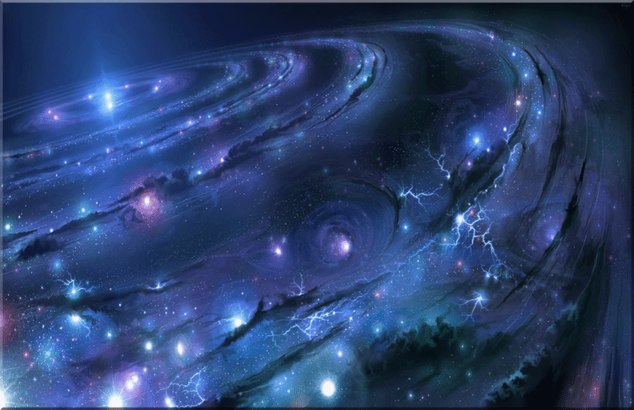
(Click.)
We have often asked why some space exists,
Why it permits the countless to briefly persist
On Mother Earth, nourished under Father Sky—
All of those finite sparks that light and die.
Behind the Veil, being that which ev’r thrives,
The Eternal ‘IS’ has ever been alive,
For that which hath no onset cannot die,
‘Though no point from which to obtain its Why.
Some time it needed to variate Everything for,
And by then turned to new bubbles to pour,
Of existence, into this universe,
Those that wrote your poem and mine, every verse.
So, as thus, thou lives on yester’s credit line,
In nowhere’s midst, now in this life of thine,
As of its bowl our cup of brew is mixed
Into the state of being that’s called ‘mine’.
Our fruits are of the universal seed,
As yet another yield of All possibility treed,
While siblings elsewhere in the entropic sea
Are also born of such probability.
The last one of us born of the sparkness
Kept a window to the outer darkness;
She looked out from a once brightly
Colored and sparkling inner reality.
Yet worry you that this Cosmos is the last,
That the likes of us will become the past,
Space wondering whither whence we went
After the last of us her life has spent?
The Eternal Saki has formed trillions of baubles
Like ours, ever—the comings and passings
Of which it ever emits to immerse
In those universal bubbles blown and burst.
So fear not that a debit close your
Account and mine, knowing the like no more;
The Eternal Source from its pot has pour’d
Zillions of bubbles like ours, and will pour.
When You and I behind the cloak are past
But the long while the next universe shall last,
Which of one’s approach and departure it grasps
As might the sea’s self heed a pebble cast.
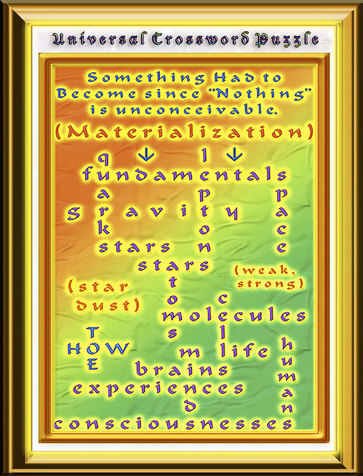
We get back to our pool game, and Ruby continues her description of All History, three billion years later.
“At 9 billion years, there is matter and dark energy equality, since the falling density of matter, both dark and atomic, become equal to that of dark energy. At 9.1 billion years, our sun and Earth form. We are inherent therein. Our solar system forms in the outer disk of the Milky Way, far out on a spiral arm, there further from harm. The stage is set for the emergence of humankind in the Cosmos—for you and I to meet and love. All this from stabilizations forming, onward and upward, in emergence, taking on a life of their own, and so on.”
“We’re going to fall in love?”
“Yes, probably.”
“Great!”
“At 13.7 billion years, we have the present time. Human civilization perhaps reaches its peak and perhaps begins heading into decline and eventual extinction due to over population, resource depletion, and environmental destruction, which generates conflict as human nation states fight for the ever dwindling resources. Hopefully, humankind is not typical and intelligent life solves the problem of balancing intelligent life needs with available resources by developing communitarian economic social structures. There have already been six near extinctions, some obliterating 95% of the species present at the time.”
“The religious were troubled by ‘God’ creating life and then then doing sway with most of it, time after time, but it gave us mammals an opening. A nervous shrew looked out of the forest on day: the dinosaurs and most species were gone, the big beasts having seemed invincible for hundreds of millions of years. The shrew jumped up and down, celebrating, and thinking, if it could: ‘Hurray, now I can evolve.’ Of course, biological evolution shows to be as numbingly slow of a process as was cosmic evolution!”

(Click.)
“The Young Earthers claim that the Earth is only about 400 years old, to save face, I suppose. By the way, Austin, I think all of this is dynamic in time. There probably cannot be a Block Universe because it’s infinite into the future, and, because it’s a complexity, as First, it can’t have a definite blueprint, especially as composite and complex, plus we would not need brains to redundantly figure things out, if all was already set to follow a world line, as in a movie already made of still frames passing by, in this frozen Block Universe idea. We shall see. Lee Smolin is looking into this.” -
 PoeticUniverse
1.7khttps://vimeo.com/373249099
PoeticUniverse
1.7khttps://vimeo.com/373249099
https://vimeo.com/363983799
https://vimeo.com/363983918
https://vimeo.com/363985189
The above are the last I'll be putting here. See below for continuation:
more
Welcome to The Philosophy Forum!
Get involved in philosophical discussions about knowledge, truth, language, consciousness, science, politics, religion, logic and mathematics, art, history, and lots more. No ads, no clutter, and very little agreement — just fascinating conversations.
Categories
- Guest category
- Phil. Writing Challenge - June 2025
- The Lounge
- General Philosophy
- Metaphysics & Epistemology
- Philosophy of Mind
- Ethics
- Political Philosophy
- Philosophy of Art
- Logic & Philosophy of Mathematics
- Philosophy of Religion
- Philosophy of Science
- Philosophy of Language
- Interesting Stuff
- Politics and Current Affairs
- Humanities and Social Sciences
- Science and Technology
- Non-English Discussion
- German Discussion
- Spanish Discussion
- Learning Centre
- Resources
- Books and Papers
- Reading groups
- Questions
- Guest Speakers
- David Pearce
- Massimo Pigliucci
- Debates
- Debate Proposals
- Debate Discussion
- Feedback
- Article submissions
- About TPF
- Help
- Other sites we like
- Social media
- Terms of Service
- Sign In
- Created with PlushForums
- © 2026 The Philosophy Forum

















